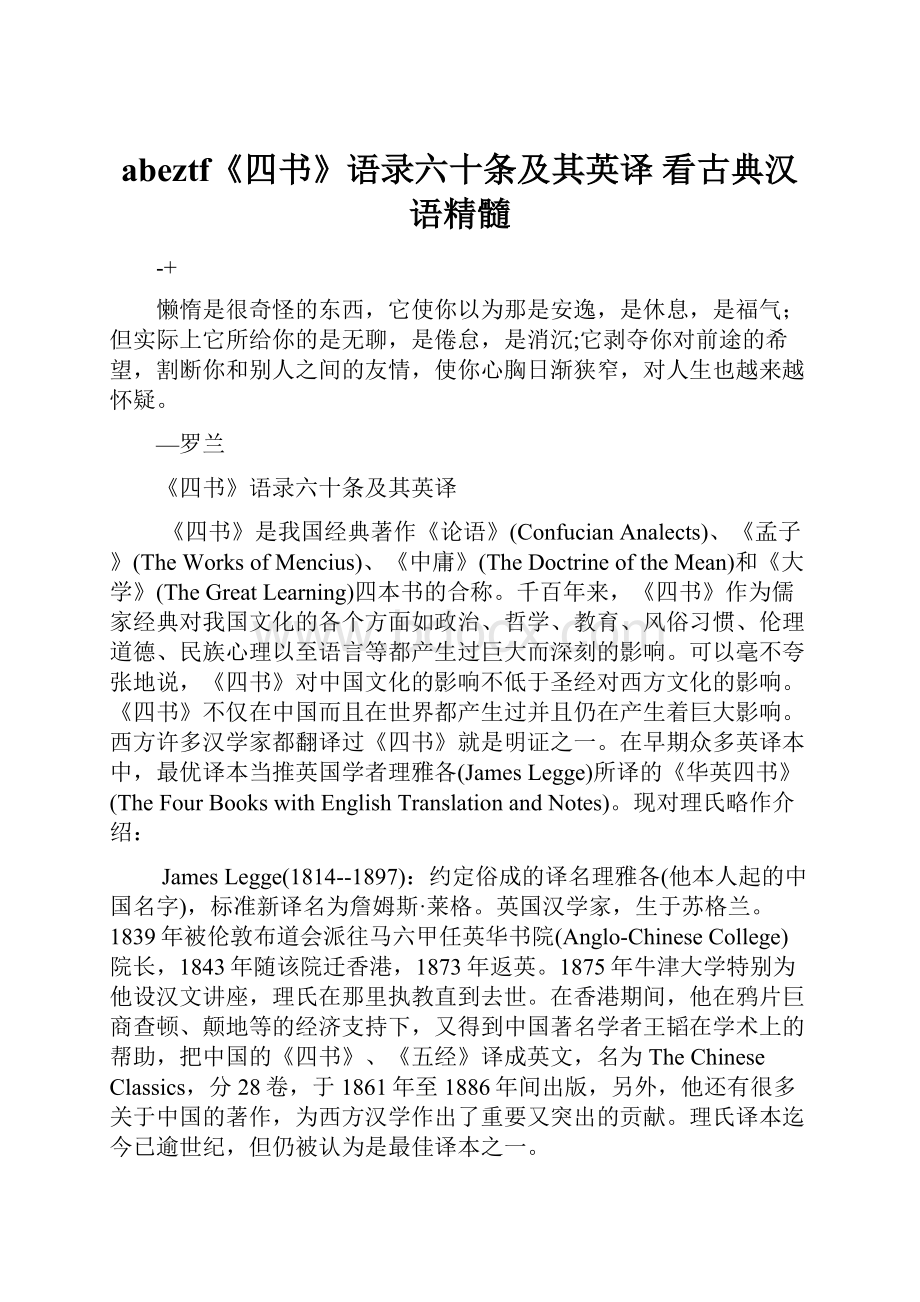abeztf《四书》语录六十条及其英译 看古典汉语精髓.docx
《abeztf《四书》语录六十条及其英译 看古典汉语精髓.docx》由会员分享,可在线阅读,更多相关《abeztf《四书》语录六十条及其英译 看古典汉语精髓.docx(11页珍藏版)》请在冰豆网上搜索。

abeztf《四书》语录六十条及其英译看古典汉语精髓
-+
懒惰是很奇怪的东西,它使你以为那是安逸,是休息,是福气;但实际上它所给你的是无聊,是倦怠,是消沉;它剥夺你对前途的希望,割断你和别人之间的友情,使你心胸日渐狭窄,对人生也越来越怀疑。
—罗兰
《四书》语录六十条及其英译
《四书》是我国经典著作《论语》(ConfucianAnalects)、《孟子》(TheWorksofMencius)、《中庸》(TheDoctrineoftheMean)和《大学》(TheGreatLearning)四本书的合称。
千百年来,《四书》作为儒家经典对我国文化的各个方面如政治、哲学、教育、风俗习惯、伦理道德、民族心理以至语言等都产生过巨大而深刻的影响。
可以毫不夸张地说,《四书》对中国文化的影响不低于圣经对西方文化的影响。
《四书》不仅在中国而且在世界都产生过并且仍在产生着巨大影响。
西方许多汉学家都翻译过《四书》就是明证之一。
在早期众多英译本中,最优译本当推英国学者理雅各(JamesLegge)所译的《华英四书》(TheFourBookswithEnglishTranslationandNotes)。
现对理氏略作介绍:
JamesLegge(1814--1897):
约定俗成的译名理雅各(他本人起的中国名字),标准新译名为詹姆斯·莱格。
英国汉学家,生于苏格兰。
1839年被伦敦布道会派往马六甲任英华书院(Anglo-ChineseCollege)院长,1843年随该院迁香港,1873年返英。
1875年牛津大学特别为他设汉文讲座,理氏在那里执教直到去世。
在香港期间,他在鸦片巨商查顿、颠地等的经济支持下,又得到中国著名学者王韬在学术上的帮助,把中国的《四书》、《五经》译成英文,名为TheChineseClassics,分28卷,于1861年至1886年间出版,另外,他还有很多关于中国的著作,为西方汉学作出了重要又突出的贡献。
理氏译本迄今已逾世纪,但仍被认为是最佳译本之一。
下面的六十条语录是根据“去其糟粕,取其精华”、“批判地吸收”等原则精选的。
这六十条及其英译,不仅能使读者对我国文化精华有所了解,而且可以帮助读者学点古文及其英译的方法。
原文
1.子曰:
“学而时习之,不亦说乎。
有朋自远方来,不亦乐乎。
人不知而不愠,不亦君子乎。
”
TheMastersaid,“Isitnotpleasanttolearnwithaconstantperseveranceandapplication?
Isitnotdelightfultohavefriendscomingfromdistantquarters?
Ishenotamanofcompletevirtue,whofeelsnodiscomposurethoughmenmaytakenonoteofhim?
’’
2.曾子曰:
“为人谋,而不忠乎?
与朋友交,而不信乎?
传不习乎?
”
ThephilosopherTsangsaid.“Idailyexaminemyselfofthreepoints:
--whether,intransactingbusinessforothers,Imayhavebeennotfaithful;--whether,inintercoursewithfriends,Imayhavebeennotsincere;--whether,Imayhavenotmasteredandpracticedtheinstructionsofmyteacher.’’
3.子曰:
“不患人之不己知,患不知人也。
”
TheMastersaid,“Iwillnotbeafflictedatmen’snotknowingme,IwillbeafflictedthatIdonotknowmen.”
4.子曰:
“诗三百,一言以蔽之,曰:
思无邪。
”
TheMastersaid.“IntheBookofPoetryarethreehundredpieces,butthedesignofthemallmaybeembracedinonesentence…‘Havingnodepravedthoughts.’”
5.子曰:
“吾十有五而志于学,三十而立,四十而不惑,五十而知天命,六十而耳顺,七十而从心所欲,不逾矩。
”
TheMastersaid,“Atfifteen,Ihadmymindbentonlearning.Atthirty,Istoodfirm.Atforty,Ihadnodoubts.Atfifty,IknowthedecreesofHeaven.Atsixty,myearwasanobedientorganforthereceptionoftruth.Atseventy,Icouldfollowwhatmyheartdesired,withouttransgressingwhatwasright.”
6.子曰:
“温故而知新,可以为师矣。
”
Themastersaid,“Ifamankeepscherishinghisoldknowledge,soascontinuallytobeacquiringthenew,hemaybeateacherofothers.”
7.子曰:
“学而不思则罔,思而不学则殆。
攻乎异端,斯害也已。
由,诲女知之乎?
知之为知之,不知为不知,是知也。
”
TheMastersaid,“Learningwithoutthoughtislaborlost;thoughtwithoutlearningisperilous.Thestudyofstrangedoctrinesisinjuriousindeed!
Yu,shallIteachyouwhatknowledgeis?
Whenyouknowathing,toholdthatyouknowit;andwhenyoudonotknowathing,toallowthatyoudonotknowit;--Thisisknowledge.”
8.哀公问曰:
“何为则民服?
”孔子对曰:
“举直错诸枉,则民服;举枉错诸直,则民不服。
”
TheDukeAiasked,saying,“Whatshouldbedoneinordertosecurethesubmissionofthepeople?
”Confuciusreplied,“Advancetheuprightandsetasidethecrooked,thenthepeoplewillsubmit.Advancethecrookedandsetasidetheupright,thenthepeoplewillnotsubmit.”
9.子闻之曰:
“成事不说,遂事不谏,既往不咎。
”
WhentheMasterheardit,hesaid,“Thingsthataredone,itisneedlesstospeakabout;thingsthathavehadtheircourse,itisneedlesstoremonstrateabout;thingsthatarepast,itisneedlesstoblame.”
10.子曰:
“富与贵,是人之所欲也。
不以其道得之,不处也。
”
TheMastersaid,“Richesandhonorsarewhatmendesire.Ifitcannotbeobtainedintheproperway,theyshouldnotbeheld.”
11.子曰:
“见贤思齐焉,见不贤而内自省也。
”
TheMastersaid,“Whenweseemenofworth,weshouldthinkofequalingthem,whenweseemenofacontrarycharacter,weshouldturninwardsandexamineourselves.”
12.子曰:
“敏而好学,不耻下问,是以谓之文也。
”
TheMastersaid,“Hewasofanactivenatureandyetfondoflearning,andhewasnotashamedtoaskandlearnofhisinferiors!
--OnthesegroundshehasbeenstyledWan.’’
13.季文子三思而后行。
ChiWanthoughtthrice,andthenacted.
14.子曰:
“默而识之,学而不厌,诲人不倦……”
TheMastersaid,“Thesilenttreasuringupofknowledge;Learningwithoutsatiety;andinstructingotherswithoutbeingwearied.”
15.子曰:
“……不义而富且贵,于我如浮云。
”
TheMastersaid,“…Richesandhonorsacquiredbyunrighteousnessaretomeasafloatingcloud.”
16.子曰:
“我非生而知之者。
”
TheMastersaid,“Iamnotonewhowasborninthepossessionofknowledge.’’
17.子曰:
“三人行,必有我师焉。
择其善者而从之,其不善者而改之。
”
TheMastersaid,“WhenIwalkalongwithtwoothers,theymayservemeasmyteachers.Iwillselecttheirgoodqualitiesandfollowthem,theirbadqualitiesandavoidthem.’’
18.子曰:
“君子坦荡荡,小人长戚戚。
”
TheMastersaid,“Thesuperiormanissatisfiedandcomposed;themeanmanisalwaysfullofdistress.”
19.子曰:
“不在其位,不谋其政。
”
TheMastersaid,“Hewhoisnotinanyparticularofficehasnothingtodowithplansfortheadministrationofitsduties.’’
20.子在川上曰:
“逝者如斯夫!
不舍昼夜。
”
TheMasterstandingbyastream,said,“Itpassesonjustlikethis,notceasingdayornight!
’’
21.子曰:
“三军可夺帅也,匹夫不可夺志也。
”
TheMastersaid,“Thecommanderoftheforcesofalargestatemaybecarriedoff,butthewillofevenacommonmancannotbetakenfromhim.’’
22.子曰:
“岁寒。
然后知松柏之后彫(diao)也。
”
TheMastersaid,“Whentheyearbecomescold,thenweknowhowthepineandthecypressarethelasttolosetheirleaves.”
23.子曰:
“其身正,不令而行;其身不正,虽令不从。
”
TheMastersaid,“Whenaprince’spersonalconductiscorrect,hisgovernmentiseffectivewithouttheissuingoforders.Ifhispersonalconductisnotcorrect,hemayissueorders,buttheywillnotbefollowed.”
24.子曰:
“无欲速,无见小利。
欲速则不达,见小利则大事不成。
”
TheMastersaid,“Donotbedesiroustohavethingsdonequickly;donotlookatsmalladvantages.Desiretohavethingsdonequicklypreventstheirbeingdonethoroughly.Lookingatsmalladvantagespreventsgreataffairsfrombeingaccomplished.’’
25.子曰:
“言必信,行必果。
”
TheMastersaid,“Theyaredeterminedtobesincereinwhattheysay,andtocarryoutwhattheydo.’’
26.子曰:
“志士仁人,无求生以害仁,有杀身以成仁。
”
TheMastersaid.“Thedeterminedscholarandthemanofvirtuewillnotseektoliveattheexpenseofinjuringtheirvirtue.Theywillevensacrificetheirlivestopreservetheirvirtuecomplete.”
27.子曰:
“工欲善其事,必先利其器。
”
TheMastersaid,“Themechanic,whowishestodohisworkwell,mustfirstsharpenhistools.’’
28.子曰:
“人无远虑,必有近忧。
”
TheMastersaid,“Ifamantakesnothoughtaboutwhatisdistant,hewillfindsorrownearathand.”
29.子曰:
“君子不以言举人,不以人废言。
”
TheMastersaid,“Thesuperiormandoesnotpromoteamansimplyonaccountofhiswords,nordoesheputasidegoodwordsbecauseoftheman.”
30.子曰:
“己所不欲,勿施于人。
”
TheMastersaid,“…Whatyoudonotwantdonetoyourself,donotdotoothers.”
31.子曰:
“过而不改,是谓过矣。
”
TheMastersaid,“Tohavefaultsandnottoreformthem—this,indeed,shouldbepronouncedhavingfaults.
32.子曰:
“有教无类。
”
TheMastersaid,“Inteachingthereshouldbenodistinctionofclasses.”
33.子曰:
“饱食终日,无所用心,难以哉!
”
TheMastersaid,“Hardisittodealwithhim,whowillstuffhimselfwithfoodthewholeday,withoutapplyinghismindtoanythinggood!
”
34.心不在焉,视而不见,听而不闻,食而不知其味。
Whenthemindisnotpresent,welookanddonotsee;wehearanddonotunderstand;weeatanddonotknowthetasteofwhatweeat.
35.道得众,则得国;失众,则失国。
是故君子,先慎乎德,有德,此有人,有人此有土,有土此有财,有财此有用,德者,本也,财者,末也。
Thisshowsthat,bygainingthepeople,thekingdomisgained,and,bylosingthepeople,thekingdomislost.Onthisaccount,therulerwillfirsttakepainsabouthisownvirtue.Possessingvirtuewillgivehimthepeople.Possessingthepeoplewillgivehimtheterritory.Possessingtheterritorywillgivehimitswealth.Possessingthewealth,hewillhaveresourcesforexpenditure.Virtueistheroot;wealthistheresult.
36.在上位,不陵下;在下位,不援上。
正己而不求于人,则无怨。
上不怨天,下不尤人。
Inahighposition,hedoesnottreatwithcontempthisinferiors.Inalowsituation,hedoesnotcourtthefavorofhissuperior.Herectifieshimself,andseeksfornothingfromothers,sothathehasnodissatisfactions.Hedoesnotmurmuragainstheaven,norgrumbleagainstmen.
37.君子之道,辟如行远必自迩;辟如登高必自卑。
Thewayofthesuperiormenmaybecomparedtowhattakesplaceintraveling,whentogotoadistance,wemustfirsttraversethespacethatisnear,andinascendingaheight,wemustbeginfromthelowerground.
38.老吾老,以及人之老;幼吾幼,以及人之幼。
Treatwiththereverenceduetoagetheeldersinyourownfamily,sothattheeldersinthefamiliesofothersshallbesimilarlytreated;treatwiththekindnessduetoyouththeyounginyourownfamily,sothattheyounginthefamiliesofothersshallbesimilarlytreated.
39.以力服人者,非心服也,力不赡也;以德服人者,中心悦而诚服也。
Whenonebyforcesubduesmen,theydonotsubmittohiminheart.Theysubmit,becausetheirstrengthisnotadequatetoresist.Whenonesubduesmenbyvirtue,intheirhearts’coretheyarepleased,andsincerelysubmit.
40.孟子曰:
“尊贤使能,俊杰在位,则天下之士,皆悦而愿立于其朝矣。
”
Menciussaid.“Ifarulergiveshonortomenoftalentsandvirtueandemploystheable.sothatofficesshallallbefilledbyindividualsofdistinctionandmark—thenallthescholarsoftheempirewillbepleased,andwishtostandinhiscourt.”
41.孟子曰:
“子路,人告之以有过,则喜;禹闻善言,则拜。
”
Meneiussaid,“WhenanyonetoldTszd-loothathehadafault,herejoiced.WhenYuheardgoodwords,hebowedtothespeaker.”
42.孟子曰:
“天时不如地利,地利不如人和。
”
Menciussaid,‘‘OpportunitiesoftimevouchsafedbyHeavenarenotequaltoadvantagesofsituationaffordedbytheEarth,andadvantagesofsituationaffordedbytheEartharenotequaltotheunionarisingfromtheaccordofMen.
43.得道者多助,失道者寡助。
Hewhofindsthepropercoursehasmanytoassisthim.Hewholosesthepropercoursehasfewtoassisthim.
44.孟子曰:
“人之患,在好为人师。
”
Menciussaid.“Theevilofmenisthattheyliketobeteachersofothers.”
45.爱人者,人恒爱之;敬人者,人恒敬之。
Hewholovesothersisconstantlylovedbythem.Hewhorespectsothersisconstantlyrespectedbythem.
46.今夫弈之为数,小数也,不专心致志,则不得也。
Nowchessplayingisbutasmallart,butwithouthiswholemindbeinggiven,andhiswillbenttoit,amancannotsucceedatit.
47.孟子曰:
“鱼,我所欲也;熊掌,亦我所欲也。
二者不